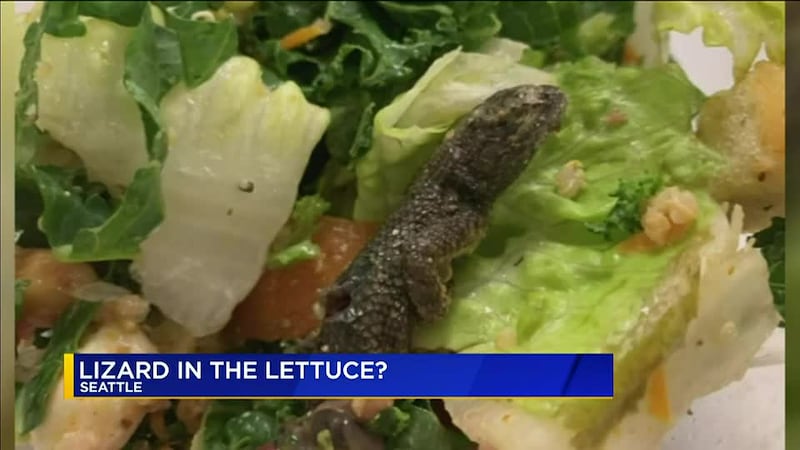A Seattle woman says she was eating a salad she bought from Evergreens when she discovered a dead lizard halfway through eating.
She filed a complaint with King County Public Health and the company, prompting the county to send over a health inspector on Friday.
The incident happened on Wednesday at the South Lake Union location at Thomas St and Boren Ave.
Maniza Qureshi says she orders salads from the Evergreens all the time.
“This is like my favorite lunch spot,” Qureshi said. But she said on Wednesday she picked up a salad and went to work to eat it. While she was eating, she noticed something wasn’t right.
“I’m like working, eating, and all of a sudden I’m picking up my fork, and I’m like woah – like that’s not part of a lettuce,” Qureshi said. “I’m just kind of turning it and that’s when I saw arms, and like, the little guts sticking out. And I kind of jumped out of my desk, called my coworkers, we’re all freaking out.”
“Shocking, horrible, terrifying, disgusting,” she said. “That’s when I was like, you know, gagging, puking. Could not believe there was a lizard in my salad.”
KIRO7 sent the photos of the lizard from Qureshi to Washington State University’s Zoology department, who confirmed the lizard is a Western Fence lizard – commonly called a blue-bellied lizard.
“You can see part of the arm missing. That’s what freaked me out,” Qureshi said. “There wasn’t a tail. That’s what I was worried about – did I actually eat that, or maybe that was in other people’s salad,” she said.
Qureshi said she immediately filed a complaint with both King County Public Health and Evergreens.
Ian Courtnage, the CEO of Evergreens, said the company pays a premium to suppliers to ensure the lettuce and greens they get are good to go.
“We’re working with a national supplier that triple washes, cuts, and bags the greens so they’re ready to eat for us – specifically to avoid any issues,” Courtnage said over the phone. He said after hearing about the incident, they immediately contacted the supplier to figure out what went wrong.
“The quality of the product we serve and safety is paramount, which is why we have this system in place. And that’s why this extremely uncommon alleged incident is so frustrating to us and obviously, the consumer,” Courtnage said. He said the supplier was now going through protocols from the farm to the delivery.
In a report from Public Health’s inspector, the document said, “No other complaints of foreign items in the salad have been received by this location,” and “Based on the items placed in the salad, it is possible that the lizard came in one of the sealed packages of greens.”
Seattle-based food safety attorney Bill Marler, an expert in the field, says finding creatures in food is not as rare as you might think.
“Snakes, mice, spiders, sometimes live things, sometimes not live things,” Marler said. “The positive thing is, even though these things are grotesque, most of the time they don’t cause human illness.”
Meanwhile, Qureshi said she’s speaking out because she believes employees serving her should have noticed the problem.
“A big, blue lizard is not something that can be overlooked,” she said.
The Public Health report said, “Staff were already required to go through the greens while filling the service container,” but recommended staff “Continue to reinforce the importance of checking for foreign materials in all foods that come in.”
The report also said the supplier for lettuce is from California but did not indicate where the kale was grown. Qureshi’s salad had both lettuce and kale.
The Western Fence lizard is most common in California, according to the Burke Museum.
©2021 Cox Media Group








